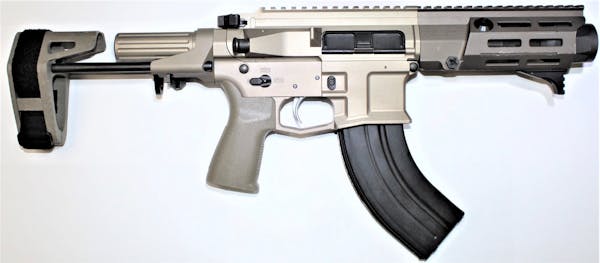Tractor trailers filled with dead car batteries made their way up to Gopher Resource's recycling plant in Eagan. The 30-plus pound blocks were fed into a giant industrial blender and soon became material for new batteries and ammunition.
Eagan-based Gopher is one of the few companies left in the nation that sells its recycled products to battery and ammo manufacturers. Stricter environmental rules have spurred the demise of several competitors, leaving Gopher in a strong position to grow.
"There used to be 100 lead smelters in the United States, but over time we are down to 12. They [smelters] … don't keep up with the regulations. Those that do, [survive]," said Gopher business development officer Dan Leach, during a recent tour of the facility.
Employment for the privately held company recently hit 600 after it added 72 workers and built a new plant in Tampa. Gopher, which generates "hundreds of millions" in sales annually, is also on track to boost lead and plastic recycling rates 20 percent this year.
"We will probably recycle 540 million pounds of lead-acid batteries this year … 300 million of that is right here in Eagan," Leach said.
Gopher has since spent more than $8 million on air and water pollution-controls in Eagan to comply with more stringent environmental rules. Next week, it begins testing a new $15 million sulfur-dioxide removal system that could be a first in the industry. The company is working with the EPA and state on that project.
Gopher has been cited in the last decade for EPA violations, including improper labeling, a missing factory sign and once in 2010 for exceeding acceptable air lead-levels under tightened EPA rules.
But Leach said company owners hope to stay ahead of environmental regulations. If Gopher stays within guidelines, it can continue to grow and provide jobs, he said.
Wayne Gjerde, recycling market coordinator for the Minnesota Pollution Control Agency, said Minnesota used to have an issue with batteries being dumped in landfills or chucked on the side of roads. But today, "batteries are one of the success stories in recycling. Now we see a pretty high rate of recycling on car batteries," noting that Gopher is the only battery smelter in the state. It now processes more than 10 million car, truck and boat batteries a year.
'I like this a lot'
On Wednesday, Andrew Lindsey and three other workers in respirators, shoveled hardened lead from the floor around the kettle and pouring area. Soon, they were guiding a nozzle of oozing silvery metal into 1-ton molds that hardened in two minutes.
"It's so cool to learn the steps to making lead," said Lindsey, who started his job April 1. "I never knew about any of this, the furnace, the kettle, the lead. I like this a lot."
Lindsey, who now makes $20.24 an hour, has to keep up with a demanding pace. It takes about 100 car batteries to create a 1-ton block of lead. Across the Gopher complex sits a sprawling warehouse filled with pallets of towering batteries.
"Some days we had 70 semi trucks full of batteries coming in. Today we have 47," Leach said while taking visitors on a tour Wednesday.
After the dead batteries were unloaded from the trucks and smashed up using an industrial blender, water and grates separated the lead, sulfuric acid and plastic that made up the batteries.
Chunks of lead were collected, washed and fed into a 2,500 degree furnace. Workers then poured the molten liquid into 1-ton blocks or 70-pound ingots that are shipped to battery manufacturers.
Supplier to ammo makers
Some of the lead was cast into cylinders and shipped to Federal Cartridge in Anoka and other ammunition makers. Gopher's been supplying lead to the military and ammunition makers for 60 years. It's also supplied the nation's largest batterymakers for decades.
"We buy millions of pounds from them every year," said Rick Leiby, metal operations vice president at East Penn Manufacturing, the country's second largest lead-acid battery maker. "Their operation does some things that not everyone does. They not only recover the lead but they also recover polypropylene plastic from the battery case. We take the plastic and turn it into new battery cases."
At Johnson Controls Power Solutions, the largest U.S. lead-acid battery maker, recycling general manager Tom Parmenter said he likes that Gopher helps keep car and truck batteries out of the waste stream. "Gopher is an important partner in our effort to bring battery recycling levels in the U.S. to 100 percent," he said. "At Johnson Controls, we are working actively to ensure that all automotive batteries get recycled safely. Gopher helps us realize that goal."
Dee DePass • 612-673-7725
Gunfire from vehicle kills 14-year-old in SUV at northeast Mpls. gas station

